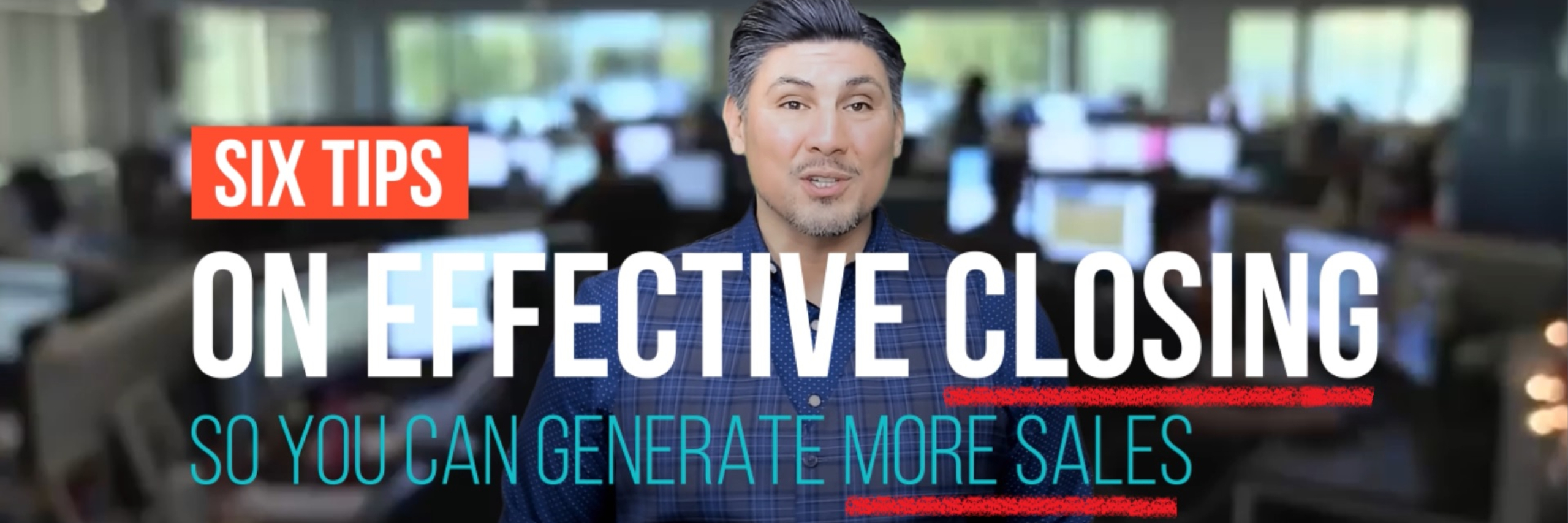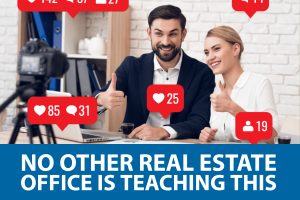6 Highly Effective Sales Closing Techniques
Hey guys, Paul Argueta here! I’m gonna give all of you salespeople six tips on how to be a more effective closer so that you can get more sales. If you’re a product of the 80s and you were in sales there’s a good chance that you remember seeing movies like Wall Street or Glengarry Glen Ross. They talked about sales, and the Glengarry leads, and always be closing, and coffee’s for closers, and “you see my watch,” you remember those lines by the great Alec Baldwin. If you’re a product of the 90s then you probably remember seeing movies like Boiler Room with Giovanni Ribisi and with Vin Diesel and a great cast, and during the 2000s or the late recent 2000s what you saw were films like the Big Short, and most recently the Wolf of Wall Street, and in all those films they talk about the importance of closing and so before I get started what I want to cover with you is what closing is not.
Being a closer is not convincing someone to do something that they didn’t want to do or purchase something that they didn’t want or need, that is not closing, that is convincing, that is you know slamming someone into a product or service that they didn’t want and two or three days later there then suffering buyer’s or seller’s remorse depending on you know the service your in. For instance, I’m in the real estate industry so convincing someone to sell what they didn’t really want to sell and pushing them so hard to get a signature usually results in two to three days later me getting a phone call letting me know that they’ve changed their mind.
What is closing? Closing is the natural end to a good presentation to a client that was already interested in your product or the service that you offer, okay, and all we did as a professional salesperson was give them all the information they needed to make an educated decision to decide to move forward on purchasing that product or on hiring you for that that service that you offer, and that is closing, and so I feel like a lot of times salespeople get bad raps because the amateurs, not the professionals, but the amateurs will really spend a lot of time trying to convince a client to buy a product or service that they didn’t want or didn’t need because they refuse to spend more time seeking out the clients that really did want them their product or service. In other words, it takes more effort to go out there and find the clients that generally want to buy or sell your product or service, so if they want that stuff right they just need more information so that they can make an educated decision on whether they want to move forward or not, but that takes effort and as salespeople that’s where prospecting comes in, that’s where cold calling comes in, that’s where talking to your sphere of influence, that’s where talking to your neighbors.
Now I realize that there are some retail establishments and there are some professions that are used to the customer coming into the door. I came from a profession, I come from a profession that is used to outbound not inbound and it’s a completely different mindset because when you’re outbound you’re physically spending a lot of time going out there seeking out the client versus the clients seeking you out, right? Depending on your product or service. Now one can argue and I do argue that if you market yourself properly, right, even in my own profession which is the real estate profession and I use techniques like digital marketing I can get the clients reaching out to me and seeking out my service, right, but typically typically if you’re in sales there’s a very good chance that you’re gonna have to go out there and you’re gonna have the prospect to find the client, right, until you build a book of business or a reputation right – to where the consumer is then seeking you out, so again going back to what I said earlier closing is simply a natural end to a conversation when the client is confirmed and made warm and fuzzy about their decision to move forward. How do you become a better closer? I’m gonna give you those six tips.
Tip number #1
You’ve got to believe in your product. Steve Ballmer took over ownership of the Los Angeles Clippers, he mandated that no one would use Android or Apple products within the organization, especially not in his presence. That’s how committed Steve was to his former employer, his former company, that made him wealthy. He was so committed to that organization that he didn’t want anybody in the Clippers organization using any other product other than a Microsoft or Window based product, right? That is believing in your product, okay, and so as a salesperson it is absolutely paramount that you believe in the quality of your product or your service and if you don’t believe in the quality of your product or your service then that’s the wrong profession, that’s the wrong product for you to be representing because if you can’t believe in it then there’s no way that the client is gonna believe in it either, okay? So tip number one you have to believe in the product or service that you are representing.
Tip number #2
You have to know your product. Now when I first got my real estate license one of the first two acronyms that I learned in sales was S.W.O.T, and that stands for strengths, weaknesses, opportunities, and threats. So you have to know your product, you have to know the strengths and weaknesses of your product. Trust me there is no foolproof 100% pure cure-all for every product or service out there, right? Everybody has strengths and everybody has weaknesses, better that you identify those strengths and weaknesses yourself so that when the prospective client brings up to your attention you know how to handle them, you know how to address them, right? So strengths, weaknesses, opportunities, right? What are the opportunities that lie within your industry? Where are the opportunities to improve on the product? Where are the opportunities for you to improve on the quality of the service that you provide, right? It’s important that you identify those opportunities and it’s important that you convey what those opportunities are to not only to yourself but to your client.
I recently came back from a conference. It was a tech conference in real estate but one of the quotes or one of the statements that I heard somebody on stage say was, “Stop asking what is it that robots cannot do because robots can virtually do everything that a human being can do at this point,” so really all professions all industries are threatened at some point especially by technologies. How is your industry, how is your product, how is your service threatened? What are the threats? Identify them, know them, recognize them, again it’s important for you to know these things because if you’re sitting down during a sales presentation and your client is bringing these things to your attention and you don’t know how to overcome those objections or how to handle their concerns then there’s absolutely no way that you’re going to be able to make them feel comfortable with the decision of moving forward.
Tip number #3
Know your scripts and have a rehearsed presentation. I’m just gonna keep that the way it is just because it’s funny. There’s some of you that are going to say, “Well I don’t want to have to use scripts and I don’t want to have a canned presentation,” and I’m going to tell you that I felt the exact same way, all right? The professional salesperson in me now knows that you have to have scripts and a rehearsed presentation. The former amateur salesperson *me* didn’t feel like I needed to have one, didn’t feel like I needed to use one. Not too long ago I gave a training on the complete guide to cold calling. I specifically talked about the importance of knowing your scripts and having a rehearsed presentation. I’m gonna share the same anecdote that I shared in that training so that you could understand in simple terms how important scripts are.
Now I recently went to a concert with my wife to go see Michael Buble, alright, we enjoyed the concert so much that we went a second time to watch it, and initially my first impression when I went the first time was this guy’s amazing, he is on point, his wit, his charm, his jokes, everything… I thought was just unbelievable. What I realized was all that wit, all that charm, all those jokes, were on cue and he had practiced them so many times that they seemed almost natural and effortless to the point where it almost seemed conversational and I didn’t even realize that he had been doing what he did. They were scripts, it was all rehearsed and it was amazing, so when you go see theater, and you see Broadway, and we see movies, right? Those are all scripts practiced and rehearsed.
I learned an acronym it was called practice, drill, rehearse. P.D.R. P as in Paul. D as in Drill. And R as in rehearse. I just chose to say “P as in Paul” because I like hearing my name, but anyway practice, drill, rehearse. Practice, drill, rehearse. Practice, drill, rehearse. Once you do this enough times what will happen is is that your whole demeanor, your whole presentation, all the language that you use both verbally and physically will come up natural, right, and so it is it is important that you know your scripts and that you have a rehearsed presentation, and I know that there will be times where the consumer the client will throw you off guard and they will say or ask certain questions that might not be apart of your presentation, but the truth is because you’ve practiced it so many times like a professional athlete who has practiced a certain move so many times you’ll be able to navigate right back onto course to that presentation that you’ve mastered and you’ll make it seem effortless and the client won’t even know that you’ve done it hundreds potentially thousands and for the real mega producers tens of thousands of times.
Tip number #4
Close early and close often. What do I mean by this? What I’m suggesting to you is this as a professional salesperson if the consumer is giving you all of the signs that they want the product or service that you are offering early enough in your sales presentation I am going to suggest that you close early. In other words, don’t be such a slave to the system that you feel like you have to go through the entire presentation when you have a consumer that is already ready to buy the product or service that your offering. I’ve done this I’ve made this mistake right where I could have signed the client within five minutes of my presentation but instead instead I decided that I was going to go through the entire 45 minute process while they fell asleep and decided to change their mind, okay, so what I’m going to suggest to you is you close early if the client is saying, I’m ready to sign, I want to purchase this product, I want to move forward.
Close early, get the paperwork out of the way collect payment and move forward, okay, do it early. Now that doesn’t happen very very often but it does happen so the flip side to this equation is close often, right, which means you are going to have to get used to the idea that you will have to ask for the appointment two, three, four, five times, right? You’re going to have to get used to the idea that you will have to ask for payment two, three, four, potentially five times until the client, right, feel satisfied that you’ve given them enough information to make them feel good about their decision to move forward with purchasing the product or the service that you have to offer, so what I’m going to tell you is is that you have to get comfortable saying, “Here’s your pen mister/missus seller. I need you to sign right here so that we can move forward.” That’s the type of conversation you want to get used to.
Now what will happen is what will happen is if they aren’t ready to move forward that’s where the objections are going to come out, right, so they’re gonna start asking you questions, it could be about pricing, it could be about terms, you know it could be a variety of different things but the truth is once you get closer to closing, right? You will notice that the client’s posture may change and then the objections start to come out, and it’s your job as a professional salesperson to then overcome those objections and handle those objections so that they feel comfortable about moving forward, all right? So it’s very simple get the idea out of your head that the client is going to come to you and simply say “Here’s my money, here’s my signature. Let’s move forward.” You have to get used to the idea that you will ask two, three, four, potentially five times for the client to sign or for the client to make payment.
Tip number #5
Never speak ill of a competitor to make yourself look better. Yeah I kind of went a little biblical on you and it was like I spoke a little backwards there, but bottom line is you got what I meant right you don’t have to speak bad about your competitor in order to make yourself look good. You want your product or service to stand on its own two feet, on its own merit, okay? In fact when you have a client who’s talking about another product or another competitor talking about their quality or service, right, let them talk. If they say that the other product or service wasn’t good then there’s no need for you to disparage it. If they talk about how how good the other product or service is I want you to agree with them. Yes, the quality and product of that service is phenomenal. Let’s talk about the quality of our product or service so that you can compare.
Listen when you attack someone their guard goes up, right, so if you immediately start attacking your competitor right and they recognize that their guard immediately goes up but if you compliment someone for instance if some of you go up to someone you say, “Hey that is a great car!” First thing they say is is no big deal right, but if you say to someone, “Hey man your car is a piece sh**,” they get defensive and they started defending their car, right, so if they’ve made a prior purchase or they’ve hired someone else or they hired a different service and you start immediately attacking that service, right, what you’re telling them is that that their their their intelligence was questioned, right? Clearly because they made the wrong decision especially if they weren’t happy, so I wouldn’t go that route. Let the client tell you whether they like the product or service right and you disagree with them and if they don’t give you any cues hey they’re a great company, hey they’re a great product, hey you know they offer phenomenal service, but let’s talk about how the quality of my product or my service comparison, right, and that’s how you make sure that you handle when your prospects talking about your competitors.
Tip number #6
Ask more questions than you talk. When I first got into my sales career I heard a quote. “We have two ears and one mouth. Use them in that proportion,” and what that meant to me was I needed to listen more than I needed to talk, okay? So it’s very important that when you’re going through the sales process and you’re getting good at closing you get good at asking a lot of questions, “So Mr. Mrs. seller why are you selling your home? Great! Where are you moving to next? Great! How soon is it that you want to be there? Great! Do you have to sell this house or can we lease this house and buy another one outright? Great! These are all questions that I would ask during a normal real estate presentation or a listing presentation or a listing consultation. Depending on your product or service you’re gonna have to get good at asking questions.
Now obviously that’s the industry that I’m most comfortable with so I just gravitate towards towards those type of question, depending on the industry you’re in you’re gonna have to get good at asking questions because the more questions you ask the more it prepares you as you’re mentally doing your sales presentation, right, that way you can cover all of the hot points and you can cover all of the objections before they even come up, right? So it’s very important that instead of doing all the talking you ask more questions. In the spirit of over-promising and under-delivering. In the spirit of under-delivering and over-promising. In in the spirit of under promising and over delivering I’m gonna give you a bonus tip.
Tip number #7
Get use to handing the pen over. So during your sales presentation you’ve got the contract, you’ve got the pen, right? At least in our profession. Now again product services are a little bit different but in service related industries when we have a contract and a pen it’s very important that you have the pen out, right, because you want to get good at when your sales presentation is done at handing the pen over to the client and telling them to sign right here and having them fill out that paperwork with their signature, okay? Get comfortable with that movement. Make sure that it becomes something that you’re used to right? It’s very simple you get the pen, hand it over, mister/missus seller sign right here, mister/missus seller sign right here. You should be doing these right like arm curls with the pen, okay? Handing the pen, handing the pen, make that your exercise, okay? I want you to get used to handing the client the pen or their signature. Now likewise if it’s a product or it’s a service where you’re collecting payment right because certain contracts will require payment get used to collecting payment and asking for the payment so “Mister/missus client, how did you want to pay for this? Did you want to use cash check or credit card because I’ve got my square reader or my paypal reader,” or whatever reader you use in the bank, right? You want to get comfortable asking these questions these are all assumptive closes that you’re getting used to now in another training I’m gonna go over all the different types of closes, including the assumptive close, the alternative of choice close.
There’s a variety of different closes but the point is those are the two bare minimum closes that you need to learn which is the handing of the pen for the signature and the “what type of payment are we gonna use cash, credit card, check, right?” I want you to be proud. I want you to be proud of your profession. The sales profession right is an industry that drives the economy because I know beyond a shadow of a doubt that once you master the skill of selling, right? Once you master that skill and once you believe in the product or the service that you’re representing you can sell anything and I’ll tell you that there isn’t a business on this planet that doesn’t need or doesn’t want more clients and once you become a proficient salesperson your skill will be in high demand and is in high demand, so it’s very important that you are sharpening these skills on a regular basis, right? It’s very important that you learn this skill to close and I hope that I armed and made you dangerous and that I gave you some great tips on how to become a more effective closer. I tell you that we enjoy putting this content out for you I hope that it helps you become a more successful sales first person and I look forward to hearing about your success.
-Paul









